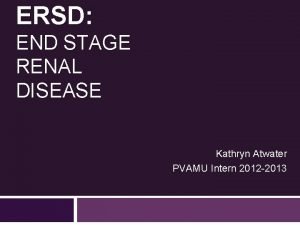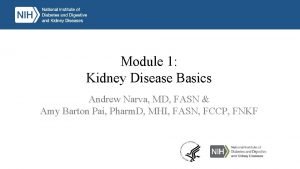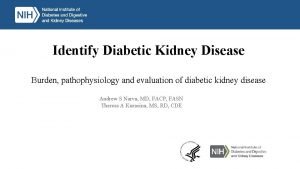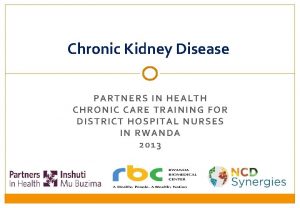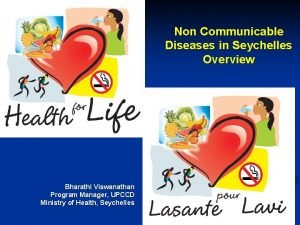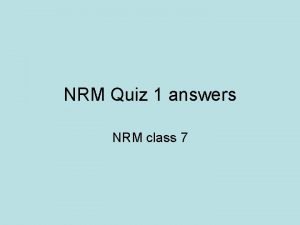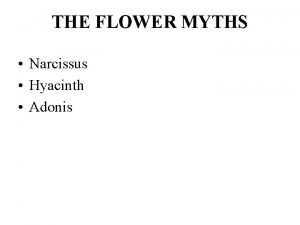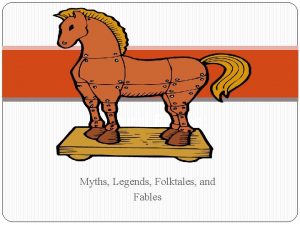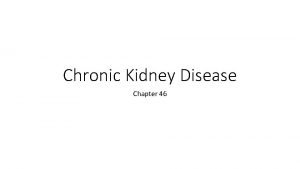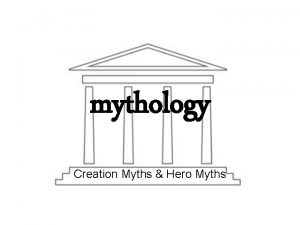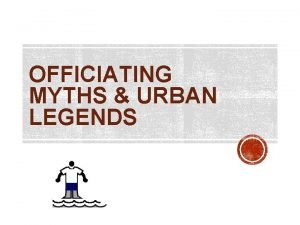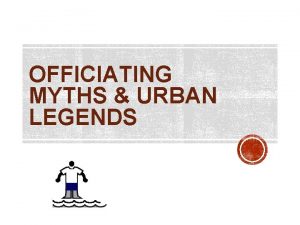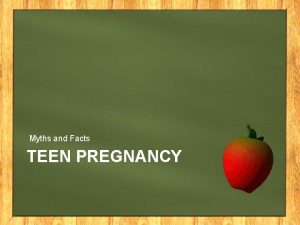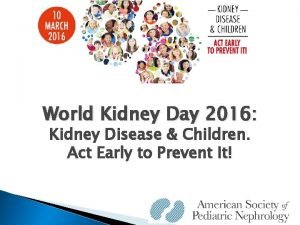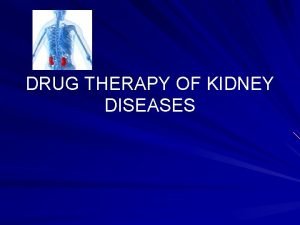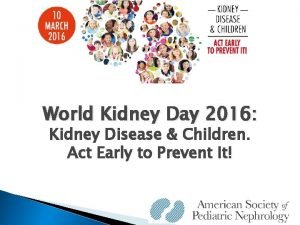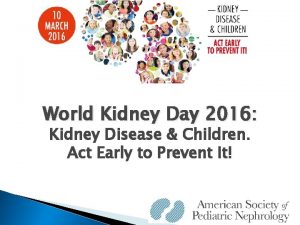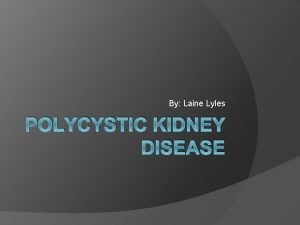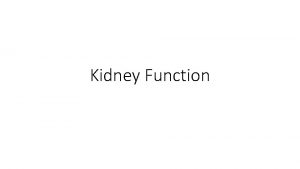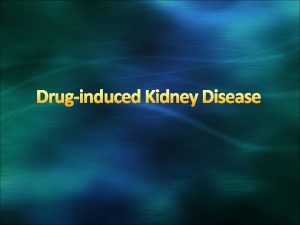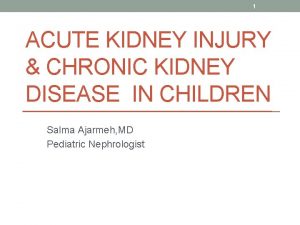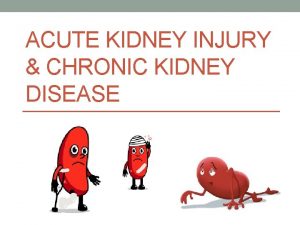Kidney Disease Awareness Programme Facts And Myths SOCIETY

























- Slides: 25

Kidney Disease Awareness Programme Facts And Myths SOCIETY OF RENAL NUTRITION AND METABOLISM (SRNM) www. srnm. in

Facts About Renal Disease Renal disease is a complex disease. • It does not occur in isolation, rather it is multifactorial. • As the disease progresses, it affects other organ systems as well. • Kidney disease can cause malnutrition. • Appropriate nutritional intervention can prevent malnutrition.

What Is Chronic Kidney Disease (CKD) ? • CKD means kidney damage for 3 or more than 3 months as defined by structural or functional abnormalities of the kidney, with or without decreased glomerular filtration rate (GFR). • GFR measures level of kidney function. • GFR describes the flow rate of filtered fluid through the kidney. • A GFR below 60 for three months or more or a GFR above 60 with kidney damage (marked by high levels of albumin in your urine) indicates chronic kidney disease.

5 Stages of CKD Depending Upon GFR ml/ minute. Stage Description GFR ml/minute 1 Kidney damage with normal kidney function 90 or above 2 Kidney damage with mild loss of kidney function 60 -89 3 a Mild to moderate loss of kidney function 59 to 44 3 b Moderate to severe loss of kidney function 44 to 30 4 Severe loss of kidney function 29 -15, 5 Kidney failure <15

Ways To Know How Well Your Kidneys Are Functioning? • You can calculate kidney function by using the following equation: (140 - Age years) x Body Weight (kg) For Men ----------------------- 72 x serum creatinine (140 - Age years) x Body Weight (kg) For Women ----------------------- x 0. 85 72 x serum creatinine Serum creatinine can be known through blood test

Facts About Renal Disease How will you know you have kidney disease? Symptoms of Kidney disease • Facial puffinees (swelling) • Pedal Edema (Swelling on legs and feet) • Loss of appetite • Weight loss • Swelling over body. • Reduced urine output, difficulty in passing urine. • Malignant hypertension (high blood pressure) in young individuals • Unexplained fatigue which develops due to low hemoglobin (anemia) or ongoing silent infection. • Patients of kidney disease have low hemoglobin as sick kidney cannot make enough hormone which is required formation of blood. • Loss of hair, sensitivity to sun rays, bony pains, unexplained rashes on face and nose, frothy urine (presence of protein in urine),

Simple Tests For Kidney Disease? Kidney function is assessed through blood test and urine test 1. Blood test: Serum creatinine BUN Sodium Potassium Calcium Phosphorus 2. Routine urine test: presence of protein

What Causes Kidney Disease? • There are several causes of kidney disease. 1. High Blood pressure can cause kidney disease.

High Blood Pressure Patients who have High Blood Pressure should • Restrict salt intake. High salt intake can cause hardening of blood vessels. • Avoid fried food. • Fats increase cholesterol and triglycerides which causes plaque (blockages in blood vessels) formation. Plaques can hinder blood supply to organs. • Eggs are good. But egg yolk is rich in cholesterol, therefore, it is not good for patients with high blood pressure and kidney disease. Patient of kidney disease can eat egg white (albumin) if doctor advises. • Patient should take blood pressure medication on time. If you are forgetful, set alarm on your mobile to remind you of your medication time. • Blood pressure medications can be taken empty stomach.

What Causes Kidney Disease? …. . Contd. 2. Diabetes can cause kidney disease. • Keep your blood sugar under control. • Regular exercise like walking and cycling can help in controlling sugar. • Diet is an important way of controlling blood sugar. • Keep your meal time fixed. • Do not skip meals. Diabetic patients must have routine checkup of kidney function (serum creatinine) and presence of proteinuria. • Patients with deranged renal function should avoid metformin (oral hypoglycemic medication)

What Causes Kidney Disease? . . Contd. 4. Painkiller (like ibuprofen, NSAIDs, aspirin ) and Aminoglycoside antibiotics can also cause kidney disease. 5. Excessive loss of fluid from body due to diarrhoea and vomiting can bring blood pressure down and affect blood supply of kidneys and kidneys can stop making urine. 6. Excessive blood loss after delivery can also lead to kidney failure. Kidneys can stop making urine. Avoid delivering baby at home. 7. Venoms (wasp sting, snake poisons) can cause kidney failure.

C) What Should Patient Of Kidney Disease Eat? Kidney Disease Patient should not eat food items which are high in potassium, sodium and phosphorus. Fruits: a) All Fruits are not good for kidney patient. Fruits like anar (pomegranate), malta, musammi (sweet lime), cheeku, tarbooz, kharbooja, , lemon, mango should not be eaten by kidney patients. These have high potassium content. b) Patient with kidney disease can eat apple, banana, papaya, orange, pineapple and pear if serum potassium is below 5. 0 mg/dl. c) Fruit juice, vegetable juice and vegetable soup, coconut water are harmful for the kidney patient.

Vegetables A) Avoid leafy vegetables like spinach (palak), mustard (sarson), chaulai, cauliflower (gobhi), brinjal (baingan), Bitter gourd (karela), tomatoes, carrots, raw salad, and dry fruits. B) Patients can eat Parval, lauki, turai, green Peas, bhindi (ladies finger), potato, tinda

Take Low Potassium Fruits • High serum K+ Can cause arrhythmia • Take low potassium fruits if serum potassium is <5. 0 mg/dl • Apple, banana, guava, pear, orange, papaya

Is it possible to remove potassium from vegetables? Yes it is possible to remove (leach) potassium from vegetables by doing the following: 1. Soak chopped vegetables in Luke warm water for half an hour or 2. Boil chopped vegetables in water. Discard water and then cook. Leaching process can be used before cooking dal (pulses).

Reduce Potassium Content Of Vegetables Leach/remove potassium from vegetables by soaking chopped vegetables in luke warm water for half an hour. Kidney Patients should refrain from eating green leafy vegetables, tomatoes, cauliflower sweet lime, lemon, carrots, raw salad, mango, dry fruits, fruit juice, vegetable soup, coconut water.

What Should Patient Of Kidney Disease Avoid? • Avoid canned Foods/Fruits/Pickles/fruit jam • Canned foods and pickles have salt as preservative. Fruit jam is high in potassium. • Restrict salt: 1 tsp of salt is equal to 5 g of salt. 5 g of salt contains 2. 5 g of sodium. Patient should not take more than 2. 4 g of sodium for better control of blood pressure and to prevent edema. • Restrict Oil: Patient should not consume more than 15 -20 g (3 -4 tea spoons) of refined/mustard oil in a day.

Sodium intake in CKD <2. 4 g/d (AHA/KDOQI Guidelines for control of Hypertension) 1 tsp=5 g =2. 5 g Na Low Sodium Diet for Renal Patients for better control of blood pressure and to prevent edema Avoid Foods containing Sodium>100 mg/100 g Avoid canned foods/fruits/Pickles/fruit jam

Should Patient With Kidney Disease Eat Food Containing Protein? Yes. Patient of kidney disease should eat low amount of protein. To calculate protein intake /day here is an example. Protein intake = weight x 0. 7 g/kg/d • A patient who has 50 kg of weight can take 35 grams (0. 7 g x body weight in kg ) of protein in one day. • He can take 1 bowl of dal (neither very thin nor very thick), 150 ml of milk and 100 grams of curd. • Rest of protein will be consumed in bread slice, chapatti and rice. • If a patient is on maintenance dialysis, protein intake should be increased to 1. 2 g/kg/day.

Do Not Eliminate Protein From Diet. Kidney Patient should take Low Protein 0. 6 g/kg/d Example: Weight of patient = 50 kg 50 x 0. 6 = 30 g of protein 1. Milk 150 ml = 4. 5 g/protein 2. Dal 1 bowl = 6 g protein 3. Chappati=2 g 8 chappaties = 12 g 4. Rice: 50 g raw = 3 g 1 2 3 Total Protein Content = 25. 5 g 4

Patient should not stop eating protein completely otherwise body muscles will break down and the patient will become malnourished. Malnutrition is an important challenge in kidney disease. It sets in silently causing patient’s Physical condition to deteriorate over time. Patient will have � Progressive weight loss � Wasting of fat and skeletal muscle tissues � Reduction of serum proteins.

Myths 1. Myths about low sodium salt These are high in potassium. Warning : High potassium is not meant for patients with kidney disease. This can be bad for heart. 2. Myth Drink a lot of water- Patients with kidney disease should restrict water intake. Water intake will depend on how much urine the patient is making. Ask your doctor how much water you should drink. Too much of water intake can cause edema (swelling) when kidneys are diseased. The kidneys will not be able to remove water from the body.

Are All Patients Alike? No every patient is different. For example If a patient has kidney stone disease then he is advised to take more fluids because patient with kidney disease should not have concentrated urine as this will precipitate stone formation. Patient should make at least 2 liters of urine/day. For this fluid intake will have to be two or more than 2 liters/day. � Do not follow what other patients advise you. � Follow your own doctor's advise. � As soon as one comes to know that he has kidney disease, he should see a nephrologist (kidney specialist).

Your Cooperation Can Help Fight Malnutrition In Kidney Patients KIDNEY DISEASE MALNUTRITION DIALYSIS For More Information Contact www. srnm. in Official Address of SRNM: Secretary SRNM, Department Of Nephrology, SGPGIMS, Lucknow President SRNM, Department of Nephrology, Sir Ganga Ram Hospital, New Delhi

Thank you for your attention !
 Hurricanes myths and facts
Hurricanes myths and facts Nephrology near atwater
Nephrology near atwater Nemo ckd
Nemo ckd Nih score
Nih score Kara potter
Kara potter Natremia
Natremia Albumin kidney disease
Albumin kidney disease Albumin kidney disease
Albumin kidney disease Symptomatic polycystic kidney disease
Symptomatic polycystic kidney disease Privacy awareness and hipaa privacy training cvs
Privacy awareness and hipaa privacy training cvs Sycamore programme
Sycamore programme Bharathi viswanathan
Bharathi viswanathan Disease state awareness
Disease state awareness Society for disease control and research
Society for disease control and research Myths and legends quiz questions and answers
Myths and legends quiz questions and answers Interesting facts about wilson's disease
Interesting facts about wilson's disease Turkic mythology
Turkic mythology The flower myths narcissus hyacinth adonis
The flower myths narcissus hyacinth adonis Polish legends: the dragon
Polish legends: the dragon Legends and myths difference
Legends and myths difference Myth legend fable
Myth legend fable Characteristics of legends
Characteristics of legends Myths and legends of king arthur
Myths and legends of king arthur Hediod
Hediod Brer possum's dilemma
Brer possum's dilemma Folk examples
Folk examples

